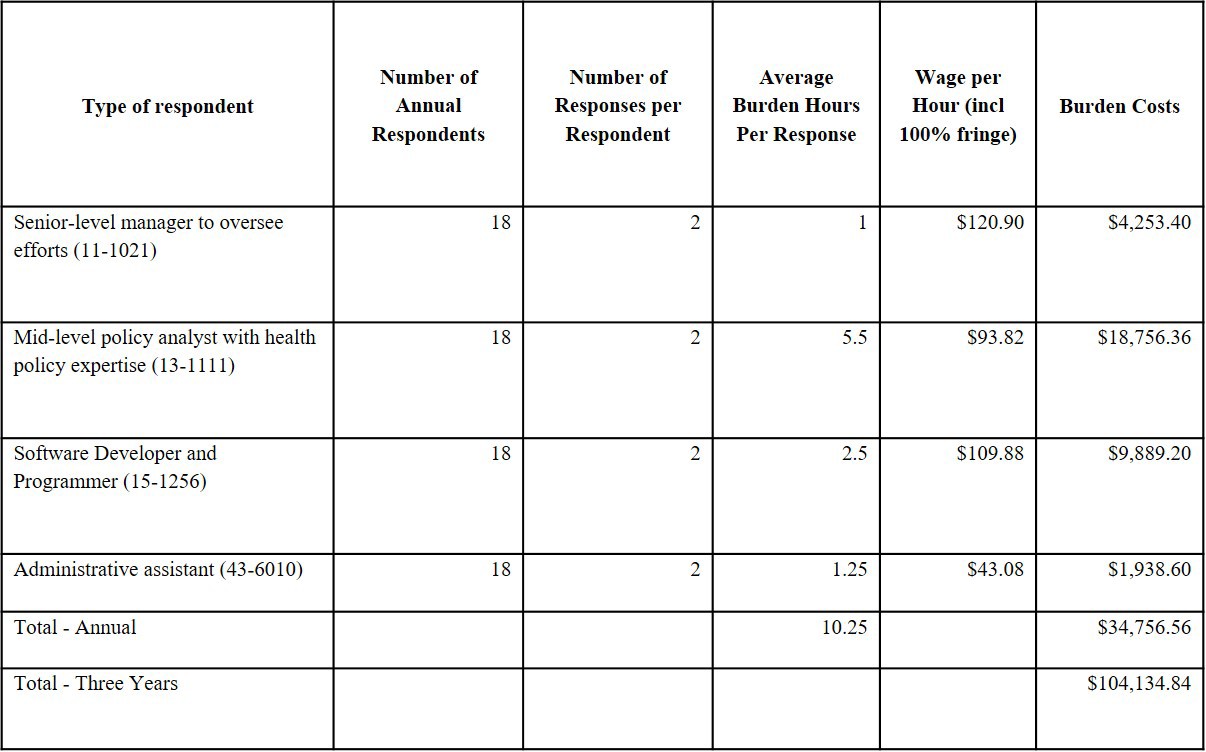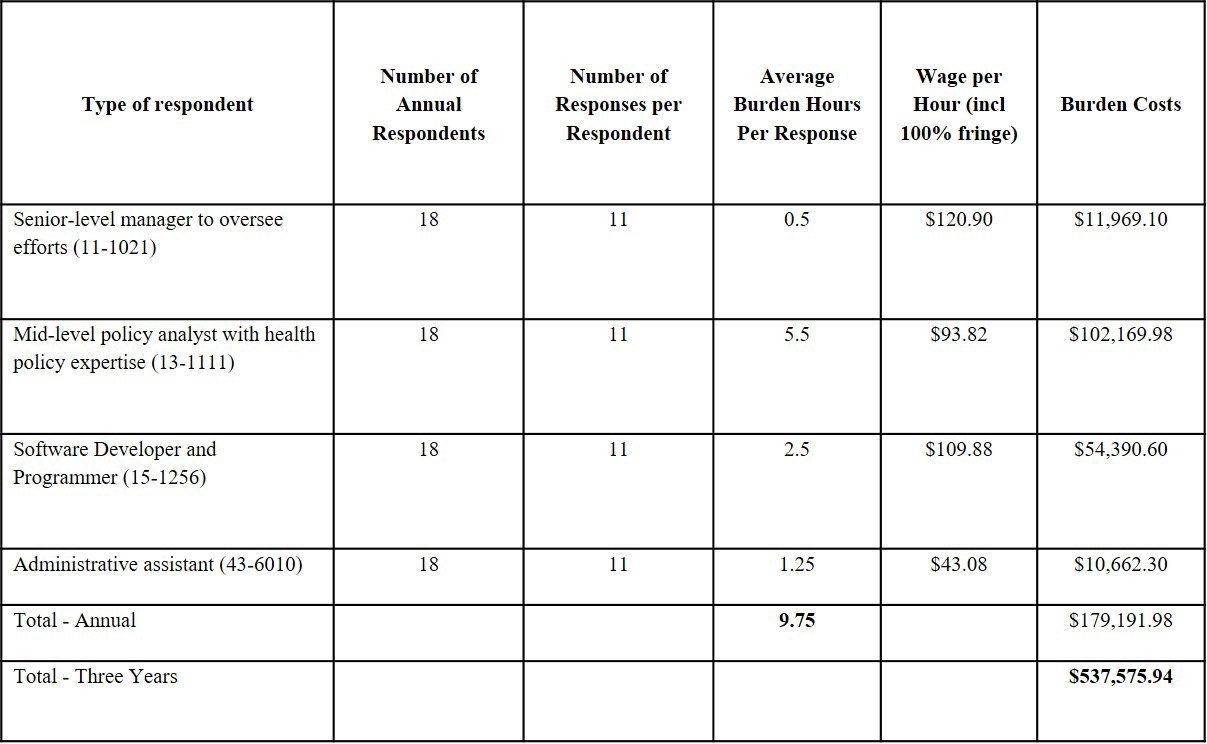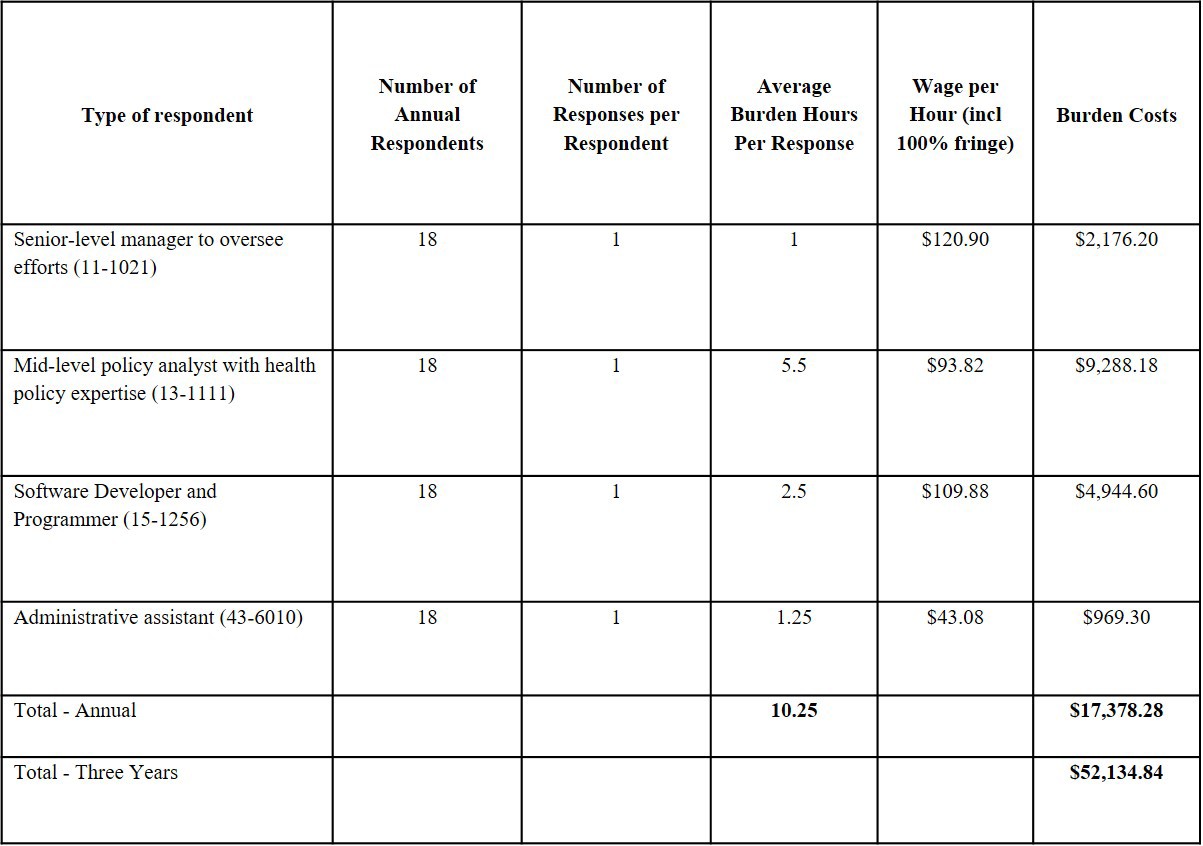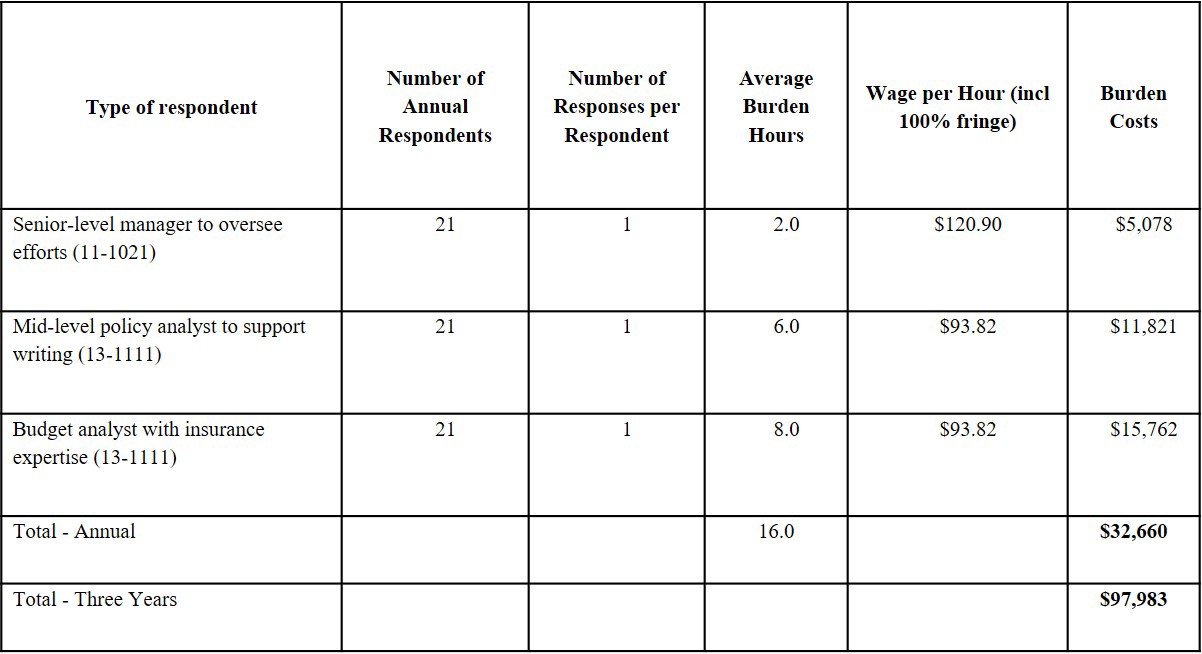CMS-10371 - Cooperative Agreement Supporting Statement (F)
CMS-10371 - Cooperative Agreement Supporting Statement (F).docx
Cooperative Agreement to Support Establishment of State-Operated Health Insurance Exchanges (CMS-10371)
OMB: 0938-1119
SUPPORTING STATEMENT FOR THE INFORMATION COLLECTION REQUIREMENTS CONTAINED IN THE COOPERATIVE AGREEMENTS TO SUPPORT ESTABLISHMENT OF STATE-OPERATED HEALTH INSURANCE EXCHANGES
(CMS 10371) (OMB CONTROL NO. 0938-1119)
The Patient Protection and Affordable Care Act (P.L. 111-148) and the Health Care and Education Reconciliation Act of 2010 (P.L. 111-152) (together referred to as the ACA) established American Health Benefit Exchanges, beginning January 1, 2014, to provide individuals and small business employees access to health insurance coverage. Section 1311(b) of the Affordable Care Act provides the opportunity for each state to establish an Exchange (now referred to as an Exchange). Cooperative Agreements to Support Establishment of the Affordable Care Act’s Health Insurance Exchanges (“Establishment Grants”) were awarded to states to support activities for implementing integral functional requirements of health insurance Exchanges within a state. Funding could be used for a state to: 1) Establish a State-based Exchange (SBE); 2) Build systems necessary to effectively link to the Federally-facilitated Exchange (FFE) operating in its state; 3) Perform functions in a Partnership within the FFE, or 4) Transition from one type of Exchange to another (e.g., from a FFE to a SBE. As of January 1, 2020, there were no active establishment grants. As a result, the following grantee reports have been removed from this Information Collection Request (ICR).
There are ongoing reporting requirements for states, which have been streamlined to insure only information necessary to provide effective oversight of their operations by CMS is collected. CMS anticipates that there will be 18 SBEs in Plan Year (PY) 2022, and 3 states operating a State-based Exchanges on the Federal Platform (SBE-FP). This ICR modification includes clarified reporting definitions, streamlining of metrics to the following reports, and alignment of data collection with FFE metric definitions to support Public Use File (PUF) creation and reduce burden of ad hoc requests to the following two templates:
State Based Marketplace Data Collection Templates (previously titled SBM Individual Market Metrics)
Bi-Annual Reporting
Open Enrollment Period Weekly and Expanded End of Open Enrollment Reporting
SBE Three-year Budget Report Template
Under 42 CFR §155.1200(b), SBEs are required to provide performance monitoring data to CMS. SBEs must provide this data at least annually and in the manner, format, and deadlines specified by CMS. In this ICR, CMS is removing reports for the grant program, and requesting further minor modification to amend the two templates: the State Based Marketplace Data Collection Templates and the Three-year Budget Report Template to clarify reporting definitions and refine the periodic reporting requirements resulting in a net decrease of reporting metrics and burden.
Information collected pursuant to the reporting requirements for SBEs will be used by CMS to evaluate states in developing and implementing Exchanges, and determine how the Secretary can provide assistance, conduct effective oversight, and to ensure program integrity to achieve the goals of the ACA.
The information collection requirements associated with these ICRs will primarily involve programmatic narrative, accompanying budget narrative and appropriate supporting documentation, and provision of performance outcome and operational data by SBEs and SBE-FPs. The SBEs are not required to track or submit any personally identifiable data. It is expected that states will create data with readily available word processing and spreadsheet programs relying on source data from information systems developed from grant funding, ACA section 1332 pass-through funding, or state funding sources and submit such information electronically. This should result in 100 percent of information being transmitted electronically.
Government Paperwork Elimination Act (GPEA)
Is this collection currently available for completion electronically?
Yes, SBEs are required to send electronic reporting to CMS. For the State Based Marketplace Data Collection Templates, SBEs submit reports to CMS via e-mail. For the SBE Three-Year Budget Reports, SBEs and SBE-FPs submit via https://servis.cms.gov
Does this collection require a signature from the respondent(s)?
No.
If CMS had the capability of accepting electronic signature(s), could this collection be made available electronically?
Not Applicable
If this collection isn’t currently electronic but will be made electronic in the future, please
give a date (month & year) as to when this will be available electronically and explain why it can’t be done sooner.
Not applicable since all data collections are electronic.
If this collection cannot be made electronic or if it isn’t cost beneficial to make it electronic, please explain.
Not applicable since all data collections are electronic.
Since this is a new program that was created through the ACA, the information that is collected has never been collected before by the federal government. Performance data for operational Exchanges will be collected directly from the states only when not available from other sources (e.g., such as transactional data submitted through the Federal Hub or third-party sources and policy-level effectuated enrollment data submitted by SBEs for to support payment to issuers of the advanced premium tax credit).
This collection does not impact small businesses or other small entities.
This collection cannot be conducted less frequently. CMS is reducing the frequency of the collection of certain metrics by moving to Bi-Annual reports under the State Based Marketplace Data Collection Template. Additionally, upon request by SBEs or at the discretion of CMS, CMS may allow less frequent reporting due to burden on program activities.
Requiring respondents to report information to the agency more often than quarterly;
During times of intensive activity of exchange business functions, our need for oversight and states needs for technical assistance may increase. At those times, we may collect information more than quarterly. An example of this is during open enrollment periods for Exchanges, weekly reporting of some metrics is required to gauge effectiveness and whether assistance is required.
Requiring respondents to prepare a written response to a collection of information in fewer than 30 days after receipt of it;
CCIIO may wish to follow up with states in between reporting periods in order to ensure close collaboration on Exchange continued operational development.
Requiring respondents to submit more than an original and two copies of any document;
Not applicable. We will not require more copies than an original and two copies of any document.
Requiring respondents to retain records, other than health, medical, government contract, grant- in-aid, or tax records for more than three years;
Not applicable.
In connection with a statistical survey that is not designed to produce valid and reliable results that can be generalized to the universe of study
Requiring the use of a statistical data classification that has not been reviewed and approved by OMB;
Not applicable. Statistical surveys CCIIO-wide to evaluate the consumer experience and quality are under development for future years. These surveys will be subject to all processes and review required by OMB.
That includes a pledge of confidentiality that is not supported by authority established in statue or regulation that is not supported by disclosure and data security policies that are consistent with the pledge, or which unnecessarily impedes sharing of data with other agencies for compatible confidential use; or
Not applicable. These information collections do not include a pledge of confidentiality.
Requiring respondents to submit proprietary trade secret, or other confidential information unless the agency can demonstrate that it has instituted procedures to protect the information's confidentiality to the extent permitted by law.
Not applicable. This is outside the scope of our reporting requirements.
A 60-day notice published in the Federal Register on September 20, 2020 (85 FR 55460). A 30-notice published on March 24, 2022 (87 FR 16740). No comments received.
Payments or gifts will not be provided to respondent.
No assurance of confidentiality is provided to respondents. Further, CMS will not collect personally identifiable information from SBEs and SBE-FPs. All reporting will be of an aggregate nature.
Data collection will not include sensitive questions.
No new grants will be awarded under existing grant programs. There is an overall reduction in burden due to the removal of the following reports: Semi-Annual Progress
Report, Monthly Budget Report, Performance Metrics Annual Report, and Quarterly Report. Additionally, minor modifications were made to amend the two templates: the State Based Marketplace Data Collection Templates and the Three-year Budget Report Template, to clarify reporting definitions and refine the periodic reporting requirements resulting in a net decrease of reporting metrics and burden.
Each form in the table above are described below, including purpose, cost, and frequency of the collection required. Labor rates used in those tables are based on the mean hourly wage, adjusted by a factor of 100 percent to include fringe benefits. Source for the hourly rates is the May 2020 National Occupational Employment and Wage Estimates United States, available by following this link: https://www.bls.gov/bls/blswage.htm. We estimate it will take a
Senior-Level Manager (11-1021) $120.90 per hour to oversee the reporting requirements, a Mid-level Policy Analyst (13-1111) $93.82 per hour to assemble and review each report, a Software Developer and Programmer (15-1256) $109.88 to compile data and develop, and an Administrative Assistant (43-6010) $43.08 to submit the information.
This ICR reflects minor revisions to the State Based Marketplace Data Collection Templates for Bi-Annual reporting and Expanded End of Open Enrollment Reporting and the SBE Three-year Budget Report Template. For PY 2022, CMS anticipates 18 states will be operating SBEs, and 3 states operating a SBE-FP. The State Based Marketplace Data Collection Templates have minor updates to provide clarification for select reporting definitions. The quarterly periodic metrics are renamed the Bi-Annual metrics for SBEs to reflect a reduced reporting frequency resulting in a decreased burden to states. The burden associated with collecting the SBE Three-year Budget Report Template was previously accounted for in the Blueprint Approval of Affordable State-based and State Partnership Insurance Exchanges ICR (OMB control number: 0938-1172) and is now being merged into this ICR. A summary of these reports is contained in the table below and specific requirements for each report and their burden calculations are in the sections below.
States are required to report select priority enrollment metrics on a weekly basis during the state’s Open Enrollment period, expanded enrollment metrics once at the conclusion of the state-specific Open Enrollment period, and additional enrollment and operations metrics bi- annually. These measures relate to volume and effectiveness of Exchange call centers, web portals, enrollment processes, outreach and education efforts, and enrollee demographics.
The purpose of this reporting is for CMS to ensure compliance with Exchange responsibilities and adherence by states to the standards set forth in the ACA and regulation.
State Based Marketplace Data Collection Templates for Bi-Annual Reporting
CMS is reducing the frequency of the collection of certain metrics by moving from quarterly metrics to bi-annual reporting. A total of 18 State Based Marketplaces are now required to fulfill reporting requirements less often, or bi-annually resulting in decreased burden. We estimate that four personnel will be involved in the developing and submitting this reporting, including assembling, reviewing, finalizing, and submitting each report, and that each SBE will submit these reports 2 times. We estimate it will take a senior-level manager 1 hours
($120.90) to oversee the reporting requirements for each response. We estimate it will take a mid-level policy analyst 5.5 hours ($516.01) to assemble and review each report. A software- developer/programmer 2.5 hours ($274.70) to compile data and develop, and an administrative assistant 1.25 hours ($53.85) to submit the information. Thus, it will take
10.25 hours to complete one bi-annual report, or 20.5 hours annually. The annual cost of bi- annual reporting requirement per SBE totals $17,378.28 per year. The total annualized burden for 18 SBEs to provide the 2 reports is 369 hours and $34,756.56.
Table A: Burden for State Based Marketplace Data Collection Templates for Bi- Annual Reporting

Open Enrollment Weekly Reports
During Open Enrollment periods, States are required to report some metrics on a weekly basis and again at the conclusion of Open enrollment. More frequent reporting helps to gauge effectiveness and more closely track those measures which have the most potential to adversely impact beneficiaries and their ability to enroll in insurance plans.
A total of 18 State Based Marketplaces are now required to fulfill reporting requirements less often, or bi-annually resulting in decreased burden. We estimate that four personnel will be involved in the developing and submitting this reporting, including assembling, reviewing, finalizing, and submitting each report, and that each SBE will submit these reports every week during Open Enrollment – for average of 11 times within a 12-month period. We estimate it will take a senior-level manager 0.5 hours ($120.90) to oversee the
reporting requirements for each response. We estimate it will take a mid-level policy analyst 5.5 hours ($516.01) to assemble and review each report. A software- developer/programmer 2.5 hours ($274.70) to compile data and develop, and an administrative assistant 1.25 hours ($53.85) to submit the information. Thus, it will take
9.75 hours to complete each weekly report, or 107.25 hours annually. The annual cost of weekly reporting requirement per SBE totals $9,955.11 per year. The total annualized burden for 18 SBEs to provide 11 weekly reports is 1930.5 hours and $179,191.98. Table
Burden for Open Enrollment Weekly Reporting

Expanded End of Open Enrollment Reporting
During Open Enrollment periods, States are required to report some metrics on a weekly basis and again at the conclusion of Open enrollment. More frequent reporting helps to gauge effectiveness and more closely track those measures which have the most potential to adversely impact beneficiaries and their ability to enroll in insurance plans.
A total of 18 State Based Marketplaces are now required to submit an expanded report at the end of Open Enrollment. We estimate that four personnel will be involved in the developing and submitting this reporting, including assembling, reviewing, finalizing, and submitting the report, and that each SBE will submit once at the close of Open Enrollment –(once per year).We estimate it will take a senior-level manager 1 hour ($120.90) to oversee the reporting requirements for each response. We estimate it will take a mid-level policy analyst
5.5 hours ($516.01) to assemble and review each report. A software-developer/programmer
2.5 hours ($274.70) to compile data and develop, and an administrative assistant 1.25 hours
($53.85) to submit the information. Thus, it will take 10.25 hours to complete the expanded report, due once annually. The annual cost of the expanded reporting requirement per SBE totals $965.46 per year. The total annualized burden for 18 SBEs to provide one expanded report is 184.5 hours and $17,378.28.
Table C: Burden for Open Enrollment Expanded End of Open Enrollment Reporting

SBE Three-year Budget Report Template
SBE and SBE-FPs are required to provide budget reports detailing Exchange expenditures and revenue for a three-year period of time. The template includes information such as the effectuated enrollment per plan for the individual and SHOP Exchanges; type of revenue; and general, marketing and outreach, call center, information technology platform expenditures. These requirements apply to the anticipated 18 states that will be operating a SBE and 3 SBE-FPs anticipated to be operating in PY 2022, for a total of 21 respondents each year.
We estimate that it will take approximately 16 hours per SBE and SBE-FP to assemble, review, finalize, and make available each report annually. We estimate that three personnel will be involved in developing and submitting this reporting. The total annualized burden for 21 entities to provide the one report is 336 hours and $32,660.
Table D: Burden for SBE Three-year Budget Report Template

Table E. Annualized Burden Table
Forms |
Type of Respondent |
Number of Respondents |
Number of Responses per Respondent |
Estimated Burden Hours per Response |
Total Estimated Burden Hours (Annual) |
Total Estimated Burden Hours (Three Years) |
Total Cost Burden (Three Year Burden) |
Bi-Annual Reporting |
State Government |
18 |
2 |
10.25 |
369 |
1,107 |
$104,269.68 |
Weekly Reporting |
State Government |
18 |
11 |
9.75 |
1930.5 |
5,791.5 |
$537,575.94 |
End of Enrollment Reporting |
State Government |
18 |
1 |
10.25 |
184.5 |
553.5 |
$52,134.84 |
SBE Three-year Budget Reports |
State Government |
21 |
1 |
16 |
336 |
1,008 |
$97,983 |
|
|
|
|
46.25 |
8,460 |
$687,693.78 |
We do not anticipate applicants incurring any capital costs. All organizations involved in this reporting are existing entities and are currently conducting this reporting.
Total annual cost to the federal government is estimated at $34,202. This is a reduction in total cost proportional to the removal of the grantee reports from the prior approved version of this ICR.
Review and approval of the State Based Marketplace Data Collection Template for Bi- Annual reporting and Open Enrollment and Expanded End of Open Enrollment Reporting and the SBE Three-year Budget Report Template requires the combined labor of Federal employees at the levels of GS-13 and GS-11 in the Washington DC area. Based on the General Schedule (GS) pay schedule effective January 2020,1 a GS-13, Step 1 earns a basic rate of $49.68 hourly, and a GS-11, Step 1 earns a basic rate of $34.51 hourly. CMS then multiplied hourly rates by a standard government benefits multiplication factor of 2 to calculate the adjusted hourly wage.
Federal Employee levels GS-13 and GS-11 Combined Labor Calculations
Total Estimated Burden Hours (Three Years)
Task |
Estimated Costs |
Tracking and Review of State Based Marketplace Data Collection Templates and Three-year Budget Report Template |
|
GS-11, Step 1 x $34.51 x 493 hours |
$17,013 |
GS-13, Step 1 x $49.68 x 346 hours |
$17,189 |
Total Costs to Government |
$34,202 |
The overall burden hours for this approval decreased because certain grant periodic reporting requirements were removed, eliminating approximately 78% of the total costs from the previously approved estimates. CMS also accounted for an increase in the number of SBE and SBE-FPs (from 15 to 21), which increased the total three-year burden hours for the four reports remaining in this package from 5,784 to 8,460.
CMS publishes information collected on the State Based Marketplace Data Collection Templates on the Enrollment Metrics Public Use File, available on the CMS website here (link): 2020 Marketplace Open Enrollment Period Public Use Files | CMS.
Information collected via the Three-year Budget Report Template will not be made

1 Source: OPM Salary and Wages Table effective January 2020. Pay & Leave: Salaries & Wages - OPM.gov
available to the public.
The OMB control number and expiration date will display on the first page (top right-hand corner) of each instrument.

| File Type | application/vnd.openxmlformats-officedocument.wordprocessingml.document |
| File Title | CMS - 10371 - Cooperative Agreement Supporting Statement |
| Author | JAMAA HILL |
| File Modified | 0000-00-00 |
| File Created | 2024-09-06 |
© 2026 OMB.report | Privacy Policy